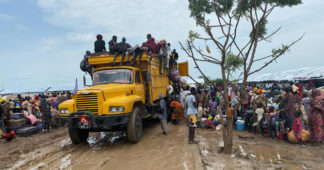Both parties in Sudan’s civil war are to blame for a looming mass famine, experts say, and the military’s blocking of U.N. aid at a border crossing with Chad exacerbates the problem.
By Edward Carver
Jul 26, 2024
Sudan’s military is blocking United Nations aid trucks from entering at a key border crossing, causing severe disruptions in aid in a country that experts fear may be on the brink of one of the worst famines the world has seen in decades, The New York Times reported Friday.
The border city of Adré in eastern Chad is the main international crossing into the Darfur region of Sudan, but the Sudanese Armed Forces (SAF), the state’s official military, which is engaged in a civil war with a paramilitary group called the Rapid Support Forces (RSF), has refused to issue permits for U.N. trucks to enter there, as it’s an RSF-controlled area.
U.S. and international officials have issued increasingly alarmed calls for steady aid access to help feed the millions of severely malnourished people in Darfur and other areas of Sudan.
Last week, Linda Thomas-Greenfield, the United States ambassador to the U.N., said that the SAF’s obstruction of the border was “completely unacceptable.”
Both warring parties in Sudan continue to perpetrate brazen atrocities, including starvation of civilians as a method of warfare. This piece focuses on the SAF’s ongoing obstruction of essential aid. The situation is catastrophic. The policy is criminal. https://t.co/FKhqQh3EI9.
— Tom Dannenbaum (@tomdannenbaum) July 26, 2024
The Sudanese who’ve made it out of the country and into Adré reported dire and unsafe conditions in their home country.
“We had nothing to eat,” Bahja Muhakar, a Sudenese mother of three, told the Times after she crossed into Chad, following a harrowing six-day journey from Al-Fashir, a major city in Darfur. She said the family often had to live off of one shared pancake per day.
Another mother, Dahabaya Ibet, said that her 20-month-old boy had to bear witness to his grandfather being shot and killed in front of his eyes when the family home in Darfur was attacked by gunmen late last year.
Now the mothers and their families are refugees in Adré, where 200,000 Sudanese are living in an overcrowded, under-resourced transit camp.
In addition to those that have made it out of the country, there are 11 million people internally displaced within Sudan, most of whom have become displaced since the civil war began in April 2023.
An unnamed senior American official told the Times that the looming famine in Sudan could be as bad as the 2011 famine in Somalia or even the great Ethiopian famine of the 1980s.
In April, Reutersreported that people in Sudan were eating soil and leaves to survive, and The Washington Postcalled it a nation in “chaos,” reporting that World Food Program trucks had been “blocked, hijacked, attacked, looted, and detained.”
In late June, a coalition of U.N. agencies, aid groups, and governments warned that 755,000 people in Sudan faced famine in the coming months.
The U.S. last week announced $203 million in additional aid to Sudan—part of a $2.1 billion pledge that world leaders made in April, which some countries have not yet delivered on.
Some officials including Thomas-Greenfield, who has dubbed the situation in Sudan “the worst humanitarian crisis in the world,” have called for the U.N. Security Council to allow aid delivery into the country even in the absence of SAF approval; it’s believed that Russia would veto such a measure.
Sudan’s civil war has seen a great deal of international interference. Amnesty International on Thursday published an investigatory briefing showing that weapons from Russia, China, Serbia, Turkey, Yemen, and the United Arab Emirates (UAE) had been identified in the country. And The Guardian on Friday reported that the passports of Emirati citizens had been found among wreckage in Sudan, indicating the UAE may have troops or intelligence officers on the ground, though the UAE denied the accusation.
The International Service for Human Rights on Friday warned that both the SAF and RSF were engaged in wrongful killings and arrests, especially targeted at lawyers, doctors, and activists. The group called for an immediate cease-fire.
The SAF and Sudanese government figures have cast doubt on international experts’ claims about famine in the country.
Also read
The US and Israeli role in Sudan’s path to war
We remind our readers that publication of articles on our site does not mean that we agree with what is written. Our policy is to publish anything which we consider of interest, so as to assist our readers in forming their opinions. Sometimes we even publish articles with which we totally disagree, since we believe it is important for our readers to be informed on as wide a spectrum of views as possible.











